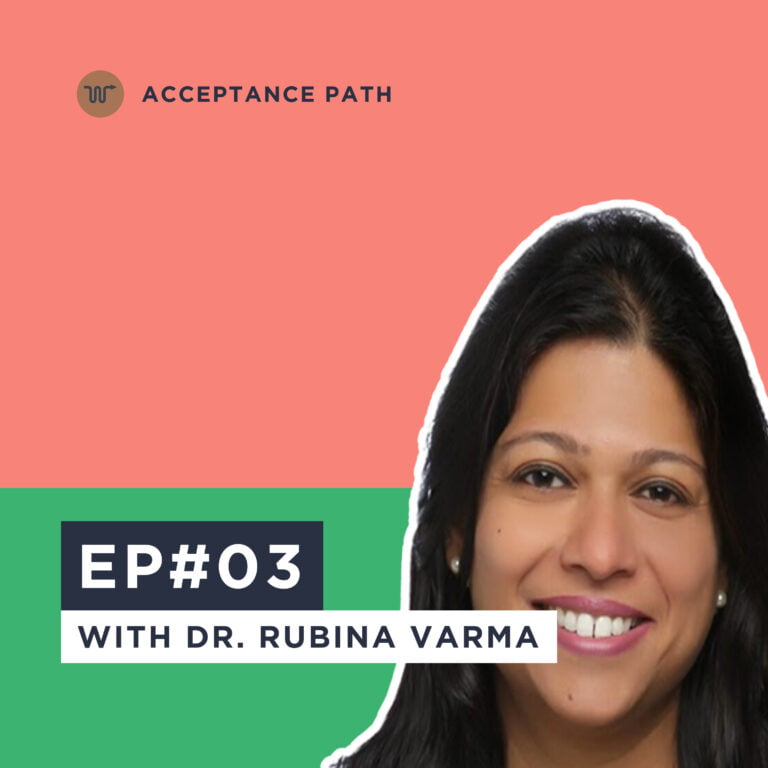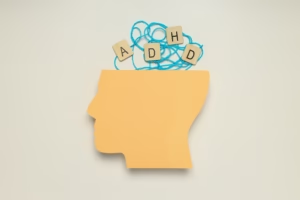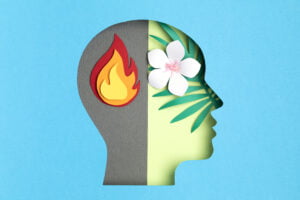In this enlightening episode of Acceptance Path, hosts Sheree and AJ welcome Dr. Rubina Varma, a seasoned HR professional with over 20 years of experience across various cultures and organizations. Dr. Varma, who holds a Ph.D. in assessment and development centers, is also a resilience coach and certified in cognitive behavior therapy. In this episode, she shares her extensive knowledge about sleep and their crucial impact on our overall well-being. Join us as we delve into the fascinating world of sleep and uncover the secrets to achieving better rest and improved health.

Two mental health experts have joined forces to make an uplifting podcast about well-being and personal growth. We use this show to share fresh and sometimes eye-opening ideas, helping listeners create a more fulfilling life. We’re not pushing any one viewpoint – instead, we’ll bring in guests from all walks of life to expand our understanding of the world. Come along with us as we explore different outlooks together.
Dr. Rubina Varma, an HR professional and resilience coach, discusses the science of sleep and its critical importance for mental and physical health. She explains sleep cycles, circadian rhythms, and how modern lifestyles disrupt healthy sleep patterns. Dr. Varma offers practical tips for improving sleep quality and quantity, emphasizing the need for consistent sleep schedules and bedtime routines. The conversation highlights how proper sleep is essential for emotional regulation, creativity, and overall wellbeing.

In today’s fast-paced world, understanding and optimizing your sleep cycle has become more crucial than ever. As we delve into the intricacies of sleep, we’ll explore how your sleep cycle impacts every aspect of your life, from mental health to productivity. Let’s embark on a journey to unlock the secrets of your sleep and discover how to achieve the restorative rest you deserve.
The Importance of Your Sleep
Your sleep cycle is not just about closing your eyes and drifting off; it’s a complex process that plays a vital role in your overall well-being. A healthy one consists of several stages, each contributing to your physical and mental restoration. Understanding these stages can help you optimize your sleep and wake up feeling refreshed and energized.
In episode 8 of the podcast, we interview another wonderful guest, Dr. Dustin Ellis, who explores the topic of rest. No, they are not the same thing. There are several big distinctions between sleep and rest. We strongly recommend you to check out the episode or read the article by clicking here.

The Stages of Your Sleep Cycle
A typical cycle consists of four to six cycles throughout the night, each lasting about 90 to 120 minutes. Here’s a breakdown of the stages within each cycle:
1. Non-REM Sleep (3 stages):
- Stage 1: Light sleep, transitioning from wakefulness to sleep
- Stage 2: Deeper sleep, body temperature drops, and heart rate slows
- Stage 3: Deep sleep or slow-wave sleep, crucial for physical restoration
2. REM (Rapid Eye Movement) Sleep:
- Dreams occur
- Brain activity increases
- Body becomes temporarily paralyzed
Your sleep alternates between these stages throughout the night, with more deep sleep occurring in the first half of the night and more REM sleep in the second half.
The Impact of Cycle Disruptions
When your cycle is disrupted, it can have far-reaching consequences on your health and well-being. Some potential effects of a disturbed sleep cycle include:
- Decreased cognitive function
- Increased risk of mental health issues
- Weakened immune system
- Hormonal imbalances
- Reduced physical performance

Optimizing Your Sleep
To make the most of your sleep cycle, consider implementing these strategies:
- Maintain a Consistent Sleep Schedule: Go to bed and wake up at the same time every day, even on weekends. This helps regulate your body’s internal clock.
- Create a Sleep-Friendly Environment: Keep your bedroom cool, dark, and quiet to support your natural sleep cycle.
- Limit Exposure to Blue Light: The blue light emitted by electronic devices can disrupt your cycle. Try to avoid screens for at least an hour before bedtime.
- Exercise Regularly: Physical activity can help regulate your cycle, but avoid intense workouts close to bedtime.
- Be Mindful of Caffeine and Alcohol: Both can interfere with your sleep, so limit consumption, especially in the hours leading up to bedtime.
- Practice Relaxation Techniques: Incorporate activities like meditation or deep breathing into your bedtime routine to prepare your body for sleep and support a healthy and deep sleep.
- If you’re interested in learning how to approach negative thoughts as it could aid you in better sleep, check out this article by clicking here.
Understanding Your Chronotype
Your chronotype, or natural sleep-wake preference, plays a significant role in your sleep cycle. There are three main chronotypes:
- Morning Larks: Naturally early risers
- Night Owls: Prefer staying up late and sleeping in
- Intermediate: Fall somewhere between the two extremes
Identifying your chronotype can help you align your daily activities with your natural cycle, leading to improved sleep quality and overall well-being.

The Role of Sleep in Mental and Physical Health
Your sleep cycle is intimately connected to your mental health. During REM sleep, your brain processes emotions and consolidates memories. Disruptions to this stage of the cycle can lead to increased anxiety, depression, and other mental health issues. Prioritizing a healthy sleep is essential for maintaining good mental health and emotional well-being.
Sleep and Productivity
A well-regulated cycle can significantly boost your productivity. When you consistently get quality sleep and complete full sleep, you’re more likely to:
- Have improved focus and concentration
- Experience enhanced creativity and problem-solving skills
- Maintain better emotional regulation
- Demonstrate increased physical performance
By prioritizing your cycle, you’re investing in your daytime performance and overall success.
The Impact of Modern Life on Sleep
Our modern lifestyle often conflicts with our natural sleep cycles. Factors such as:
- Artificial lighting
- 24/7 connectivity
- Shift work
- Jet lag
They can all disrupt our cycles. Being aware of these challenges and taking steps to mitigate their impact is crucial for maintaining a healthy sleep in today’s world.

Sleep Tracking and Technology
With the advent of sleep tracking devices and apps, it’s easier than ever to monitor your sleep cycle. These tools can provide insights into your sleep patterns, helping you identify areas for improvement and optimize your sleep cycle over time.
The Science Behind Your Sleep
Understanding the science behind your sleep cycle can help you appreciate its importance. During deep sleep, or slow-wave sleep, your body undergoes crucial physical restoration. This is when your immune system gets a boost, hormones are balanced, and cellular regeneration occurs. The deep sleep stage is essential for washing away toxins and proteins that build up in your brain throughout the day.
REM sleep, another vital component of your cycle, is when your brain is highly active. During this stage, your body is paralyzed, but your mind is processing emotions, consolidating memories, and fostering creativity. A healthy sleep cycle ensures you get enough of both deep sleep and REM sleep, contributing to your overall well-being.
Sleep Cycles and Emotional Regulation
Your sleep cycle plays a crucial role in emotional regulation. During REM sleep, your brain absorbs and processes the emotions from your day, making them less impactful. This is why after a good night’s sleep, you often feel less affected by the previous day’s stressors. A disrupted cycle can lead to increased emotional reactivity and difficulty managing stress.
The Connection Between Sleep and Learning
Your sleep cycle is also integral to learning and memory consolidation. During sleep, particularly in the REM stage, your brain makes connections between new information and existing knowledge. This process enhances your ability to recall information and apply it in new ways. By prioritizing your sleep cycle, you’re giving your brain the opportunity to process and retain new information more effectively.

Sleep Cycles and Physical Health
A healthy sleep cycle is crucial for maintaining good physical health. During deep sleep, your body repairs tissues, builds bone and muscle, and strengthens your immune system. Disruptions to your sleep cycle can lead to various health issues, including:
- Increased risk of cardiovascular disease
- Higher likelihood of obesity and diabetes
- Weakened immune function
- Hormonal imbalances
- Accelerated aging
By maintaining a consistent and healthy sleep cycle, you’re investing in your long-term physical health and well-being.
The Impact of Sleep Cycles on Decision Making
Your sleep cycle significantly influences your decision-making abilities. When you’re sleep-deprived or experiencing disrupted sleep cycles, your prefrontal cortex – the part of your brain responsible for complex thinking and decision making – is less active. This can lead to:
- Impaired judgment
- Increased risk-taking behavior
- Difficulty weighing options and considering consequences
- Reduced ability to make ethical decisions
By prioritizing your sleep cycle, you’re ensuring that your brain is well-equipped to make sound decisions throughout the day.
Sleep Cycles and Relationships
Your sleep cycle can have a significant impact on your relationships. When you’re well-rested and maintaining a healthy sleep cycle, you’re more likely to:
- Communicate effectively
- Manage conflicts better
- Show empathy and understanding
- Have more energy for social interactions
On the other hand, disrupted sleep cycles can lead to irritability, mood swings, and decreased patience, potentially straining your relationships with family, friends, and colleagues.

Adapting Your Sleep Cycle to Different Life Stages
Your sleep cycle needs may change throughout different stages of life. For example:
- Teenagers often experience a shift in their cycle, making it difficult to fall asleep early and wake up early for school.
- New parents may need to adjust their cycles to accommodate nighttime feedings.
- Older adults may experience changes in their sleep cycles, including more frequent awakenings during the night.
Understanding these changes and adapting your routines accordingly can help you maintain a healthy sleep cycle throughout your life.

Conclusion: Embracing the Power of Sleep
Understanding and optimizing your sleep cycle is a powerful tool for improving your overall health, well-being, and quality of life. By prioritizing sleep and implementing strategies to support a healthy sleep, you can unlock your full potential and enjoy the countless benefits of restorative rest.
Remember, your sleep cycle is unique to you. Take the time to understand your individual needs and patterns, and don’t hesitate to consult with a sleep specialist if you’re struggling to achieve restful sleep. With patience and persistence, you can harness the power of your sleep cycle and transform your life, one night at a time.
By embracing the importance of your sleep cycle and making it a priority in your daily life, you’re investing in your physical health, mental well-being, and overall quality of life. Sweet dreams and healthy sleep await!




